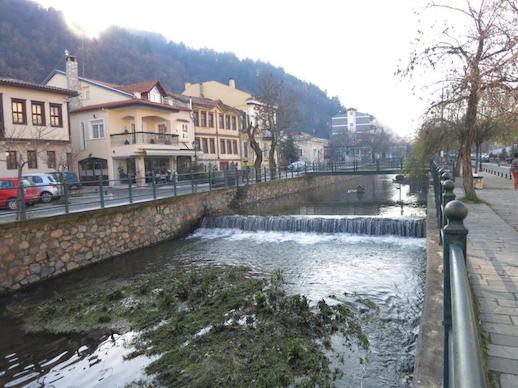Words and picture by Peter Papathanasiou
There’s a river that runs through the town where I was born, deep in a wooded valley in the mountains of northwestern Greece. It’s a town now but it was a village back then, some thirty years ago. I changed a lot in that time too, as you might imagine. I was adopted as a baby and raised on the other side of the world as an only child. It was a generation before I returned to my homeland from the convict colony. But the Sakoulevas River remained just as it was, a snaking waterway, dividing Florina in two.
I never saw the river then, as a baby. Or if I did, I can’t remember it. My eyes were just slits, my brain still forming. Now I sat reunited with my two older brothers at a small riverside café. I watched them drink espressos like shots and smoke their bodyweights in tar. I scratched away on a notepad as I sipped mountain tea – sideritis – literally translated as ‘he who has the iron’. It was served with honey and lemon. Middle brother Georgios called it ‘shepherd’s tea’ because shepherds prepared it while herding their flocks on the steep hillsides.
‘Our mother made the best shepherd’s tea,’ he sighed. ‘I can’t drink anyone else’s now.’
I winced at the spear of pain in my chest.
My biological parents died before I could meet them. I cried when I visited their graves, with sadness, regret. I pushed the tea aside and ordered a locally-sourced mineral water – xino nero (‘sour water’).
Meeting my brothers was surreal. We stared at each other for a very long time, reading each other’s features. I had Georgios’s chin and Vasilios’s eyes. Mannerisms came later. Georgios laughed like me. Vasilios touched his nose when anxious. As we sat, they introduced me to every acquaintance that approached our crowded little café table as their long-lost brother from Australia. I was met warmly, as if long-awaited and much-anticipated.
I had walked down to the river from my family’s sugarcubed house on a hill. A pleasant ten minutes through tight winding streets, beneath balconies where women beat rugs with large paddles. My brothers drove their car. No walking for them. Walking is for peasants, they told me. So was sitting by the river. But I had insisted, even though their preference was for a new café in the plateia with black marble interiors and girls and thumping techno beats. Out here, the only music was the river. The melody was the gentle babble of pure mountain water over stones. The vocals were the occasional honk from a grand white goose or quack from a plump grey duck. Love padlocks sat fastened to the many small footbridges that crossed the river. Couples kissed and took photos.
‘So why did Papou end up building a house here and not on an island?’
I asked my brothers a question stemming from years of disappointment. The expectant look in people’s eyes at dinner parties when they asked me which idyllic Greek island my family was from. The let down when I answered that they weren’t from any.
‘The islands back then weren’t like they are now,’ Georgios replied. ‘They were full of mosquitos and disease. People were exiled onto islands. That’s why all the refugees from Asia Minor settled here, in the newly-won lands of the north.’
He was referring to the population exchange between Greece and Turkey. Florina was only annexed by Greek troops a decade earlier, during the First Balkan War of 1912. Our grandparents weren’t here then. They arrived in 1923 as Orthodox Christians expelled from the Cappadocia region of Turkish Anatolia, all because they secretly worshipped a cross and not a crescent. Our Papou saw the native Greeks tearing down minarets the day he arrived in Florina. He could barely hold down his bread ration for hunger. When he laid the house’s cornerstone, he cut the throat of a cock and let the blood spill on all four corners, starting with the eastern corner first. He dug the foundations with a shovel; the blade brought up pieces of bone, white and smooth. The bones of Jews, apparently. Using soil he carried from Cappadocia, Papou planted three orange trees in the front yard from seeds he found on the road. The trees still stood, as proudly as the stone house. Surrounding houses had since been demolished, tall blocks of flats erected in their place.
‘Papou used to wash in the river,’ Vasilios added. Being the eldest, he was named after our grandfather. ‘At least, he did when it wasn’t completely mud.’
The river was at its best after rain, flowing strong and full; the town’s healthy pulse. At the height of summer, it shrunk to a trickle, as lush green grasses sprouted and took the river’s place beneath weeping willows. In the depths of winter, the stormwater outfalls were snapshots, each a frozen waterfall in time.
A stray calico cat appeared from beside the river and slowly pattered up to our table. It was stringy and underweight, but its eyes were clear. It sniffed warily at our feet before it finally plucked up the courage to leap into my lap. I patted it, watched it curl and extend its front paws in pleasure, heard it purr, felt its warmth as it sat. Georgios looked at the cat with contempt – and at me – and calmly lit another cigarette.
‘It’ll be winter soon,’ he said, exhaling a stream of white smoke. ‘Up here in the mountains, the only animal you want to be during winter is a hibernating bear.’
